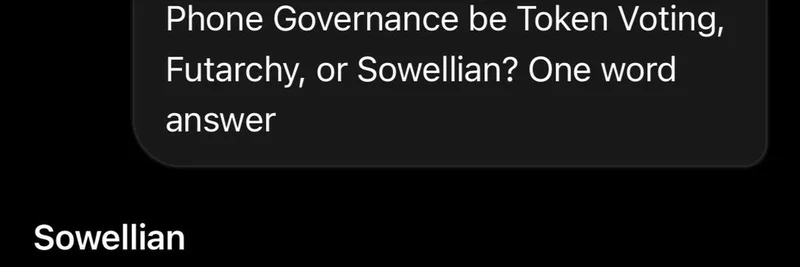Ever wondered how the next big Web3 device should be governed? Well, a recent tweet from DeanTheMachine on X has sparked some intriguing discussions in the Solana community. In the post, Dean shares screenshots where both Grok and ChatGPT unanimously pick "Sowellian" as the ideal governance model for the Solana Seeker mobile phone, over traditional token voting or futarchy. Let's break this down and see why this matters, especially for meme token enthusiasts on Solana.
First off, what's the Solana Seeker? It's the latest crypto-native smartphone from Solana Mobile, building on the Saga's legacy. Priced at around $500, the Seeker boasts an integrated wallet for enhanced security, a brighter display, better camera, and longer battery life. It's designed as the "definitive Web3 mobile device," complete with Seeker ID—a combo of your wallet address, username, and Genesis Token. Powered by SKR, the native token of the Solana Mobile economy, it's a hub for decentralized apps, airdrops, and all things Solana. For meme token traders, this means seamless on-the-go trading and community engagement without compromising security.
In the tweet, Dean asks: "Should the Solana Seeker Mobile Phone Governance be Token Voting, Futarchy, or Sowellian? One word answer." Both AIs respond with "Sowellian." Here's the ChatGPT version for good measure:
Understanding the Governance Options
To appreciate why Sowellian stands out, let's quickly unpack the choices:
Token Voting: This is the go-to for many decentralized autonomous organizations (DAOs) in crypto. Holders of governance tokens, like SKR in this case, vote on proposals proportional to their holdings. It's democratic but can lead to whale dominance—where big holders sway decisions. Think of it as a shareholder meeting, but on the blockchain. Sites like Coinbase explain it well.
Futarchy: Coined by economist Robin Hanson, this futuristic model uses prediction markets to decide policies. Instead of voting, people bet on outcomes—if a proposal is predicted to boost metrics like user adoption or token value, it gets implemented. It's all about "vote on values, bet on beliefs," as per Hanson's manifesto. In DAOs, it could minimize bad decisions by tying them to real-world results.
Sowellian: This one's newer and inspired by economist Thomas Sowell, known for emphasizing empirical outcomes, incentives, and knowledge in decision-making (check out his book Knowledge and Decisions). From Dean's own tweets, Sowellian governance focuses on "increasingly better decisions" through structured, evidence-based processes. A whitepaper is reportedly coming soon, but it seems to prioritize merit and results over pure democracy or markets, avoiding pitfalls like short-termism in token voting or speculation in futarchy.
Why did the AIs choose Sowellian? Probably because the Seeker isn't just a phone—it's an ecosystem play. Token voting might favor short-term pumps, common in meme token circles, while futarchy could get bogged down in complex bets. Sowellian, with its focus on long-term, informed decisions, aligns with building a sustainable Web3 device that integrates seamlessly with Solana's high-speed blockchain and its vibrant meme token scene.
Implications for Meme Tokens on Solana
Solana's ecosystem is meme token heaven, thanks to platforms like Pump.fun and low fees. The Seeker could supercharge this by making mobile trading more secure and intuitive. If governed Sowellian-style, decisions might prioritize user experience and security over hype—think better dApp integrations for meme launches or airdrops tied to Genesis Tokens. This could attract more builders and traders, boosting SKR's utility and, by extension, the broader Solana meme market.
Dean's tweet highlights a growing conversation in crypto: How do we govern hardware-software hybrids like the Seeker? With Solana Mobile aiming to challenge the mobile duopoly (Apple and Google), innovative governance could be key to decentralization.
If you're into Solana memes or Web3 gadgets, keep an eye on this. Dean mentions a Sowellian whitepaper dropping soon—could be a game-changer. What do you think: Is Sowellian the future, or should we stick with tried-and-true token voting? Drop your thoughts in the comments!



